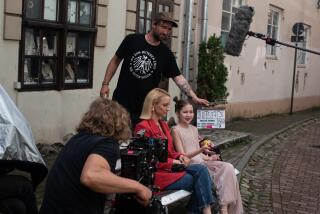American Trades Retirement for Chance to Lead Lithuania
HINSDALE, Ill. — Valdas V. Adamkus soon will be an American president.
His home stands on an oak-studded hill, at the end of a private drive, in the midsection of the United States.
Across the street, a neighbor flies a huge Stars and Stripes.
Adamkus retired last year from a high-ranking post in the federal government, which provides him with a pension worth roughly two times the salary of his new job.
And he holds a U.S. passport.
Adamkus plans to retain dual citizenship even as he takes the helm of a country that abuts the Baltic Sea: Lithuania, a former piece of the now-broken Soviet Union. It is his native land--the land he fled more than 50 years ago, when it was invaded by the Soviets at the end of World War II.
In October, he successfully challenged Lithuania’s residency requirement for presidential candidates. Then, with the help of votes from other Lithuanians abroad, he narrowly edged a reformed Communist in the contest for a five-year term as head of state. “I still can’t believe it,” he said.
After his inauguration later this month, the 71-year-old Adamkus will begin work in a 14th century palace in Vilnius, the capital. Previous tenants include Czar Alexander I and Napoleon.
Adamkus left for Lithuania late last month after an 11-day trip home that became a frenzied series of activities. He met with Chicago Mayor Richard M. Daley and Illinois Gov. Jim Edgar, attended a reception in his honor given by fellow members of Chicago’s Union League Club, made a farewell visit to the Midwest office of the Environmental Protection Agency (where he was regional administrator) and finally--on the very last evening--began “packing my suits and shirts.”
He plans to keep his wood-and-brick contemporary house here. Two nephews and his 94-year-old mother-in-law will live in it. His wife, Alma, Lithuania’s new first lady, “will be coming back three or four times a year,” Adamkus said before his departure.
Holding citizenship in both countries is permitted constitutionally. Still, Adamkus doesn’t anticipate exercising his right to vote for his U.S. counterpart in Washington. His heart and mind are rooted now in Lithuania, he said, and always have been.
“I am not a newcomer,” he said in English that remains accented despite 50 years of residency here. “I am not a carpetbagger.”
He published an anti-German newspaper as a youth during the Nazi occupation of Lithuania and was incarcerated in a camp for displaced persons. He stayed active in the emigre community here.
He regained his Lithuanian citizenship in 1992, one year after the Soviet Union was formally dissolved. He traveled there often on vacation.
Yet he realizes that the seeds of his victory lie in his American identity and Lithuania’s desire to move closer to the West.
“I am the product of a Western society and a Western culture. I believe strongly in democratic principles,” he said. “This is what gives me the strength and the confidence that after five years, I will have at least put the country in the right direction.”
His first order of business is to attack deep-rooted corruption, “to restore the confidence of the people and get their respect so that we can be trusted among free nations.” He wants to help Lithuania move closer to NATO and European Union membership--the country is now on the back burner as far as those groups are concerned.
Adamkus gained a measure of fame when he testified to Congress in 1983 that top EPA officials in Washington changed a report by his staff that accused Dow Chemical Co. of polluting Michigan streams with a toxic chemical dioxin. EPA administrator Anne Burford was later forced to resign.
Two years later, at the White House, President Reagan presented him with the government’s highest award for a civil servant, the Distinguished Executive Presidential Rank.
But the closest he got to elective office was a failed run for the Metropolitan Sanitary District Commission in Chicago.
He will miss, he said, his friends, his former co-workers, golf and the Chicago Bulls. And he will miss his low-key life.
More to Read
Sign up for Essential California
The most important California stories and recommendations in your inbox every morning.
You may occasionally receive promotional content from the Los Angeles Times.








